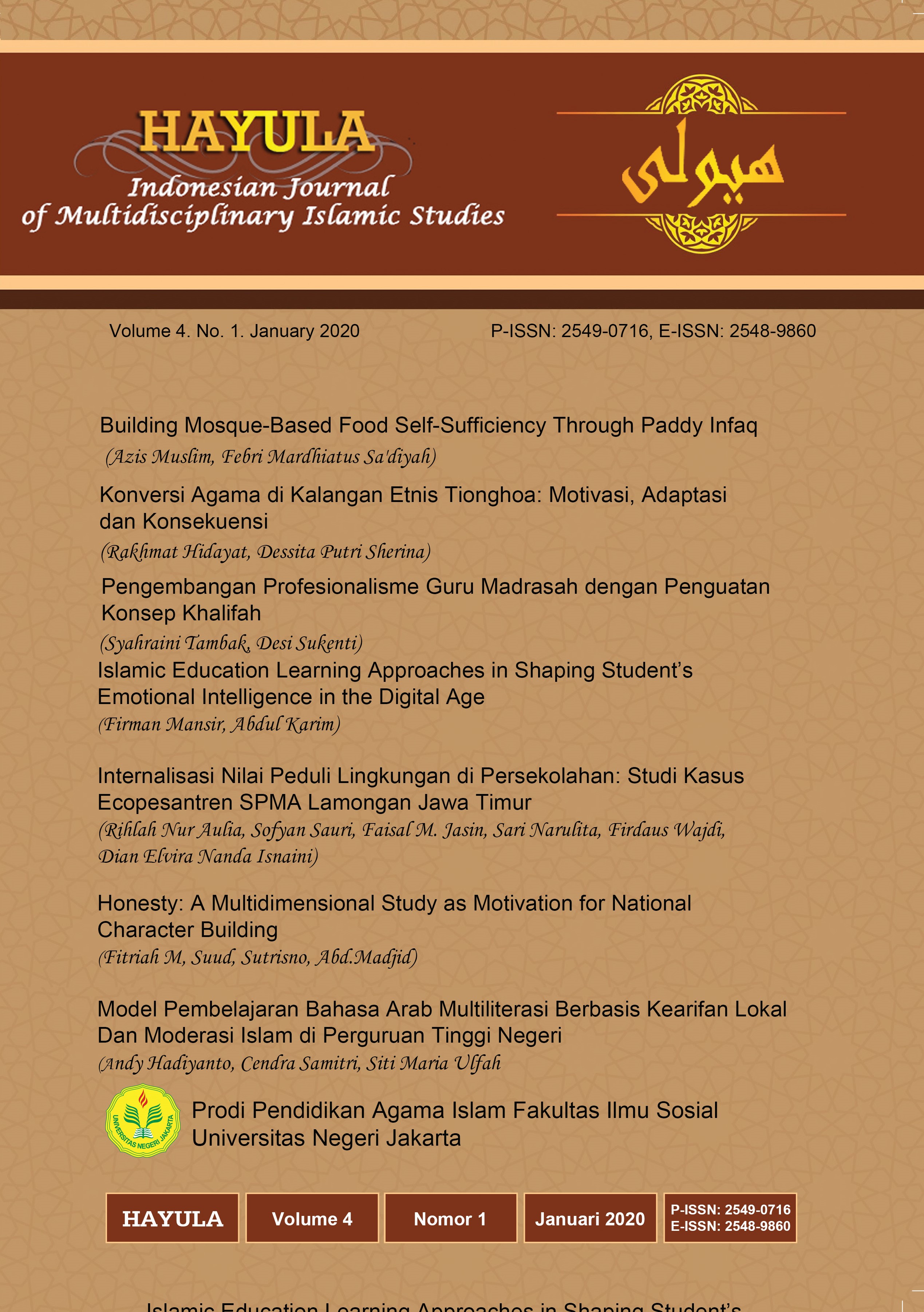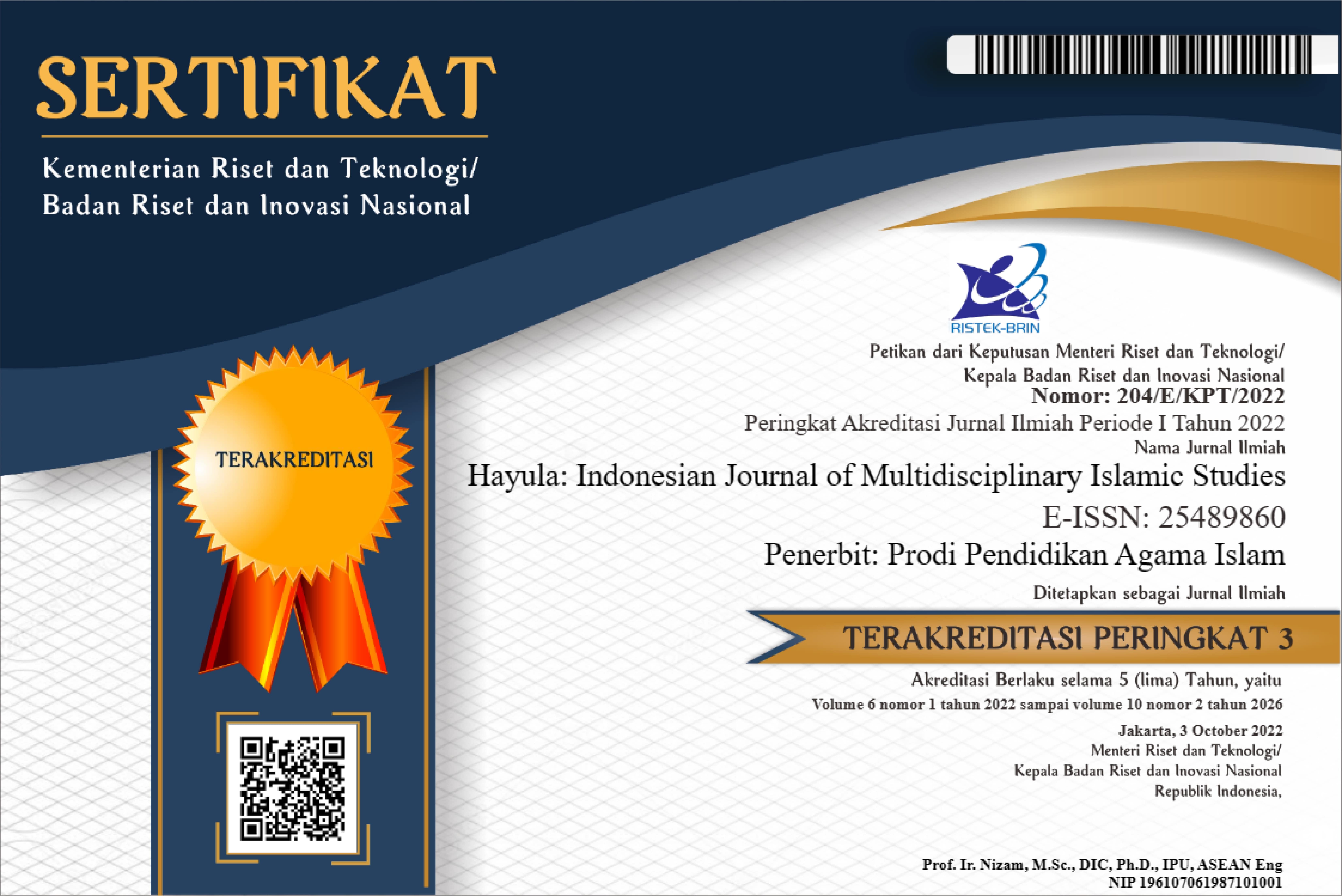Islamic Education Learning Approaches in Shaping Students’ Emotional Intelligence in the Digital Age
DOI:
https://doi.org/10.21009/004.01.04Keywords:
Islamic Education Learning, Emotional Intelligence, Digital Age.Abstract
Over the last several decades have witnessed nothing short of a transformation in the study of religion. The human race lives in a time of deep concern for the future of the biosphere. Globalization can bring a paradox to the practice of Islamic education. Islamic education has a significant role in shaping the ethics and morals in the life of the people and of the nation to create religious and devoted people. The objective of this study was to describe the Islamic education learning approaches discourse strategy, the basic concept, classification, strategies, and its steps of developingto develop. This is a qualitative study using the main data source from literature, so it needs data elaboration from various literature. The data collection procedure by analyzing the literature using an analytical descriptive method. The results show that it’s time for Islamic education learning to develop an active learning method through good strategic planning so it can shape the students’ emotional intelligence. The implication of this result is scientific contribution and the concept of strategic approaches to Islamic education and as one of the efforts in developing the students’ emotional intelligence.
References
Alfinnas, S. (2018). Arah baru pendidikan Islam di era digital. Fikrotuna: Jurnal Pendidikan Dan Manajemen Islam, 7(1), 804–817.
Amirudin, N. (2019). Problematika pembelajaran pendidikan agama Islam di era digital. In Prosiding Seminar Nasional Prodi PAI UMP (pp. 181–192). Pendidikan Agama Islam Universitas Muhammadiyah Purwokerto.
Bakti, A. F., & Meidasari, V. E. (2014). Trendsetter komunikasi di era digital: Tantangan dan peluang pendidikan komunikasi dan penyiaran Islam. Jurnal Komunikasi Islam, 4(1), 21–44.
Basir, A. (2019). Pengaruh kecerdasan emosional terhadap prestasi belajar siswa pada mata pelajaran PAI di SMPIT Iqra’ kota Bengkulu. Institut Agama Islam Negeri Bengkulu.
Cahyo, H., & Kistoro, A. (2014). Kecerdasan emosional dalam pendidikan Islam. Pendidikan Agama Islam, 11(1).
Campbell, H. (2016). Digital religion: Understanding religious practice in new media worlds. London and New York: Routledge Falmer.
Cantwell, C. D., & Rashid, H. (2015). Religion, Media , and the Digital Turn.
Creswell, J. W. (2018). Research Design: Pendekatan Metode Kualitatif, Kuantitatif dan Campuran. Yogyakarta, Indonesia: Pustaka Pelajar.
Dewi, T. S. (2016). Upaya guru PAI dalam mengembangkan kecerdasan emosional siswa di SMP Negeri 1 kecamatan Karanggede kabupaten Boyolali tahun pelajaran 2015/2016. Institut Agama Islam Negeri Salatiga.
Fatimah, S. (2017). Peran guru agama dalam mengembangkan kecerdasan emosional dan spiritual pada anak di SMP Swasta Al-Hikmah Medan Marelan Pasar IV Barat. Universitas Islam Negeri Sumatera Utara.
Forrest, R., & Campbell, H. (2016). The practice of digital religion. Texas, USA: Springer Fahmedien Wiesbaden. https://doi.org/10.1007/978-3-658-08460-8
Kgatle, M. S. (2018). Social media and religion: Missiological perspective on the link between Facebook and the emergence of prophetic churches in southern Africa, (2011), 1–6.
Karim, A. (2016). Pembaharuan pendidikan Islam multikulturalis. Jurnal Pendidikan Agama Islam -Ta’lim, 14(1), 19–35.
Karim, A., Mardhotillah, N. F., & Samadi, M. I. (2019). Ethical leadership transforms into ethnic: exploring new leaders’s style of Indonesia. Journal of Leadership in Organizations, 1(2), 146–157.
Khapipudin, N. (2015). Metode pengembangan kecerdasan emosional dalam pembelajaran PAI siswa kelas V A SDN Dadapsari kecamatan Semarang Utara kota Semarang tahun pelajaran 2014/2015. Universitas Islam Negeri Walisongo Semarang.
Khoirunnisa, S. (2013). Peranan guru PAI dalam pembinaan kecerdasan emosional siswa di SMA Martia Bhakti Bekasi. Universitas Islam Negeri Syarif Hidayatullah Jakarta.
Kurniawati, A. (2019). Upaya guru dalam mengembangkan kecerdasan emosional pada siswa di SMK Muhammadiyah 3 Gemolong tahun 2018/2019. Institut Agama Islam Negeri Surakarta.
Mahsun, A. (2013). Pendidikan Islam dalam arus globalisasi: Sebuah kajian deskriptif analitis. Epistemé, 8(2), 260–278.
Maryani, N. (2018). Pengaruh kecerdasan emosional terhadap akhlak siswa SMP Negeri 4 Sleman Yogyakarta. Universitas Islam Indonesia.
Masitoh & Laksmi Dewi, Strategi Pembelajaran, (Jakarta: DEPAG RI, 2009), 37
Muri Yusuf. (2014). Metode Penelitian Kuantitatif, Kualitatif dan Penelitian Gabungan. Jakarta, Indonesia: Prenadamedia Group.
Nurbaiti, S. (2017). Strategi guru dalam meningkatkan kecerdasan emosi (emotional quotient) melalui PAI di SMA Negeri 2 kecamatan Simpang Kiri kota Subulussalam. Universitas Islam Negeri Ar-Raniry Darussalam, Banda Aceh.
Paul Eggen, Don Kauchak. (2012). Strategi Model Pembelajaran. Jakarta: PT Indeks.
Rahmat, P. (2009). Penelitian Kualitatif. Equilibrium, 5(9), 1–8.
Riyadi, I. (2015). Integritas nilai-nilai kecerdasan emosional dalam kurikulum PAI di SMA: Perspektif Daniel Goleman. Hunafa: Jurnal Studia Islamika, 12(1), 141–163.
Saiful Bahri Djamarah dan Aswan Zain. (2006). Strategi Belajar Mengajar. Jakarta: Kencana Prenada Media.
Sastriani. (2018). Dinamika pembelajaran PAI di era digital: Studi di MTsN Wawotobi, Kabupaten Konawe. Shautut Tarbiyah, 38(24), 1–18.
Sukmadinata, Nanah Syaodih (2016). Pengembangan Kurikulum Teori dan Praktik, Cet.
XIX; Bandung: PT Remaja Rosda Karya.
Sumikan. (2011). Pengaruh kecerdasan emosional, kecerdesan spiritual dan prestasi belajar PAI siswa kelas X SMK Negeri I Dlanggu Mojokerto. Universitas Islam Negeri Malang.
Ventura, M. (2019). Religion and Innovation. In C. Zanoni (Ed.), Calibrating Research Approaches and Suggesting Strategies for a Fruitful Interaction (p. 1). Trento: Center for Religious Studies.
Downloads
Published
How to Cite
Issue
Section
License
Authors who publish with this Journal agree to the following terms:
- Author retain copyright and grant the journal right of first publication with the work simultaneously licensed under a creative commons attribution licensethat allow others to share the work within an acknowledgement of the work’s authorship and initial publication of this journal.
- Authors are able to enter into separate, additional contractual arrangementfor the non-exclusive distribution of the journal’s published version of the work (e.g. acknowledgement of its initial publication in this journal).
- Authors are permitted and encouraged to post their work online(e.g. in institutional repositories or on their websites) prior to and during the submission process, as it can lead to productive exchanges, as well as earlier and greater citation of published works.
Users/public use of this website will be licensed to CC BY







